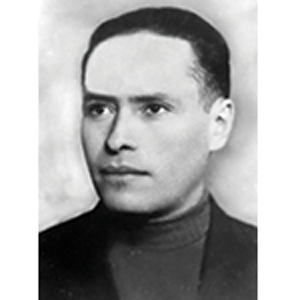 Itzhak Kotkowski was born on December 25, 1921 in Warsaw, Poland. He grew up in the Jewish Quarter or “Old Town,” and his father was an owner of a general store. He had three sisters. When Germany occupied Poland in September 1939, “Izio,” as he was called, was beaten up for being Jewish, which made him decide to leave Poland. He and a group made it across the Bug River out of Poland to Bialystok, Byelorussia. For a time Izio lived with a friendly family and earned a living by working the streets, buying and selling small items, such as wristwatches, mostly to Soviet soldiers.
Itzhak Kotkowski was born on December 25, 1921 in Warsaw, Poland. He grew up in the Jewish Quarter or “Old Town,” and his father was an owner of a general store. He had three sisters. When Germany occupied Poland in September 1939, “Izio,” as he was called, was beaten up for being Jewish, which made him decide to leave Poland. He and a group made it across the Bug River out of Poland to Bialystok, Byelorussia. For a time Izio lived with a friendly family and earned a living by working the streets, buying and selling small items, such as wristwatches, mostly to Soviet soldiers.
Heeding a warning of stricter Soviet policies soon to come, Izio attempted to make his way back to Poland with sixteen others, but they were soon arrested by the Communists for association with an “enemy of the state.” In April 1940, he was sentenced to eight years in an “educational work camp” for being a “socially dangerous element.” In the fall of 1940, Izio was taken to Archangelsk, a transition camp where he was imprisoned along with other Polish Jews and non-Jews. He and hundreds of other prisoners were taken on a barge by sea to the port of Naryan-Mar. When the barge became locked in by the ice of the Arctic waters, they were forced to continue inland on foot for three days in 60 degree below zero temperatures. Upon arrival in the middle of the vast expanse of empty taiga (forested tundra), they were ordered to build their camps. Izio worked as a slave laborer for a year, felling timber in the construction of a nearby railroad. He survived the worst of conditions and the complete loss of all hope.
In the summer of 1941, Germany attacked Russia, and Stalin announced an amnesty for all Polish prisoners as they were now needed to help fight the Germans. Encountering severe anti-Semitism amongst fellow Poles, Izio decided to defect and take his chances on his own. Longing for a warmer climate, he made his way south by train and by foot through many countries and stayed in Dzhambul, Kazakhstan. There he picked cotton, quarried stones, and worked in a plant processing sugar beets until 1944.
In 1946, Izio reunited with his sister Ania. He went to Israel in 1948, where he served in the Israeli Army during the War of Independence until 1956. He married an Israeli woman, Aviva, and had two sons. Exhausted from a life in which he witnessed so much death, he immigrated with his family to Mexico in 1957 and then to the United States in 1979. It was in El Paso, Texas that he finally found peace, prosperity, stability, and, above all, the freedom he had longed for. Itzhak passed away in 2008.